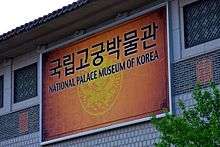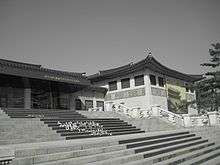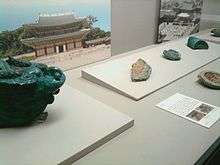National Palace Museum of Korea
 | |
| Korean name | |
|---|---|
| Hangul | 국립고궁박물관 |
| Hanja | 國立古宮博物館 |
| Revised Romanization | Guknip Gogung bakmulgwan |
| McCune–Reischauer | Kuknip Kokung pakmulkwan |
| Established | September 1908 |
| Location | Sajikno 34 (Sejongno), Jongno-gu, Seoul, South Korea |
| Director | Soh Jae-gu |
| Website | gogung.go.kr |
National Palace Museum of Korea is a national museum of South Korea located in Gyeongbokgung Palace, Seoul.

History
The museum first began as the "Korean Imperial Museum", which was established in September 1908 and was originally located in Changgyeonggung Palace. On November of the following year, the museum was opened to the public. However, on April, 1938, the ruling Japanese government renamed the museum to the "Museum of Yi dynasty".[1]
In March, 1946, after the liberation of Korea, it was renamed "Deoksugung Museum". In 1991, Cultural Heritage Administration instituted the museum in Seokjojeon (석조전, Stone Hall) of Deoksugung Palace, and in 2005, the museum was relocated to a modern building inside Gyeongbokgung Palace.
Collection
National Palace Museum of Korea houses over 40,000 artifacts and royal treasures, from the palaces of the Joseon Dynasty and the Korean Empire, of which 14 are National Treasures of South Korea.[2] It displays records, state rites, architecture, clothing, royal life, education, culture, paintings and music of the dynasty’s ruling era.[3] It also has among its collection the royal seal of King Gojong of Joseon, which was used for his personal letters to Russian czar and Italian emperor after 1903. It disappeared during Japanese rule and was re-covered from a US-based Korean collector in 2009.[4]
Permanent exhibitions
- Royal Symbols and Records
- State Rites
- Joseon Science
- Palace Architecture
- Royal Life
- Royal Childbirth and Education
- Royal Scholarly Culture
- Korean Empire
- Royal Court Paintings
- Royal Court Music
- Royal Palanquins
- Joseon Water Clock

Special collection
The Museum houses 1,200 volumes of historial texts including 150 copies of Uigwe from the Joseon Dynasty that were looted in 1922, during rule by Japan under the supervision of then Resident-General of Korea Itō Hirobumi. They were repatriated in December 2011 and a special exhibition was held from 27 December 2011 to 5 February 2012.[5] The copies chronicled the royal rituals of King Gojong and King Sunjong, the last two emperors of Joseon Dynasty and Daehan Empire before Korea was annexed in 1910.[6]
See also
References
- ↑ "history of the museum" (in Korean). National Palace Museum of Korea website. Retrieved 2008-04-24.
- ↑ "history of the museum". National Palace Museum of Korea website. Retrieved 2008-04-24.
- ↑ "Seoul's best museums" CNN Go. 27 October 2011. Retrieved 2011-11-04
- ↑ "Recovered Imperial Seal Goes on Display". Chosun Ilbo. 18 March 2009. Retrieved 30 May 2012.
- ↑ "Looted Korean Texts Return Home from Japan". Chosun Ilbo. 6 December 2011. Retrieved 23 April 2012.
- ↑ Lee, Claire "Looted Korean royal texts return home" Korea Herald. 6 December 2011. Retrieved 2012-04-23
External links
| Wikimedia Commons has media related to National Palace Museum of Korea. |
- National Palace Museum of Korea Official Site
- (Korean) Brief information about National Palace Museum of Korea
Coordinates: 37°34′36″N 126°58′31″E / 37.57667°N 126.97528°E
